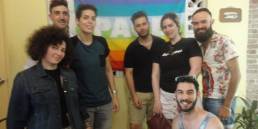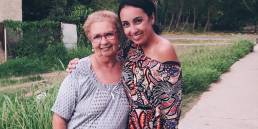My parents came to this country from Havana, Cuba in 1990. Two years later, they had me, not on the island, but they may as well have. I grew up in Hialeah, which according to Wikipedia is home to the largest Cuban and Cuban-American population in the U.S. I was surrounded by Cuba everything, everywhere. I knew the impermeable smell of Violetas, most of the street names en El Vedado, the slang from the chusmeria, and the aroma of frijoles negros cooking on the stove. I even had the memories. The black and white store fronts and the sepia-toned images of el Malecon. I had never gone to Cuba and yet I missed it and longed for it as if it were my home. I recently learned there is a word in Welsh for this feeling–“Hiraeth.” The word means homesickness for a place that you cannot return to, no longer exists, or maybe never was. I think the literal translation in Cuban would be ni de aqui, ni de alla.

Ni de aqui, ni de alla. That did not become more clear than when I left Hialeah for college. It is in the hallowed halls of the University of Florida that I realized how different I was and how unique my experiences as a Cuban-American in Hialeah had been. What do you mean there isn’t a Publix Sabor here? You mean, your parents have never asked you if you were a communist? How have you never tried tostones?! The list goes on and on. Suddenly I was too Cuban.

When I visited Cuba for the first time in 2012, I was ready to use all my Cubanidad. I felt like I had trained for this moment by whole life. Instead, I was met with cousins who said I dressed differently, that I spoke a little strange…se nota que tu no eres de aqui. Remember, I am not from here or there, ni de aqui ni de alla. Suddenly, I was too Yuma.
Nonetheless, that trip was amazing. I was able to see my paternal grandmother for the first time ever. Unfortunately, Paquita had Dementia and could not remember who I was. That did not stop her from constantly scolding me to peinarme el pelo. I soaked up every minute I could with my abuela Paquita who died shortly after our visit. I realized that that short trip, while incredible, was through my father’s jaded lens. I longed to have my own take on Cuba.

When I was selected to be a CubaOne participant, I was elated. This organization felt like I had an opportunity to make my own Cuba story with other women who had felt like they were neither from here or there. That is exactly what happened.
The most important thing that happened to me during my trip to Cuba was getting connected to my Afro-Cuban roots. I was so nourished by that aspect of my Tu Cuba trip. Growing up I only knew White Cubans, except for my father. I struggled with feelings of inadequacy and was teased mercilessly because of my coiled, kinky hair and afro-centric features. You don’t look Cuban. Not only was I ni de aqui ni de alla, I was neither blanca or negra. I was a strange hybrid known as Jabada, as they called me. Seeing Cubans in Cuba, with my espendru, who looked like me, made me feel accepted.
Thanks to CubaOne, I was able to meet the oldest living relative on my father’s side, my great aunt, Tia Amparito. I was introduced to a whole other part of my family that was rarely talked about. This was the Black side of my family and, as such, record keeping was not the best. In fact, we can only go as far as my great, great, grandmother, Lucila, and there are no pictures of her to date. Lucila fought with Maceo en la Columna invasora de Oriente as a freed slave. The void of not being able to retrace that part of my lineage hurts. I imagine who my ancestors were, where in the continent of Africa they resided before being shackled and what that harrowing journey was like for them across many seas. After meeting Tia Amparito, I was humbled and filled with love for the lineage of headstrong, resilient, and brilliant Black women who came before me and have guided my path onward. It is vital that their stories be heard and conserved.

Prior to my trip to CubaOne, I thought everyone wanted to leave the island. That was my understanding based solely on my family. Now, I know that there’s a growing number of people who are proud of their island and are investing in its future. Activists and human rights advocates included. Revolutionary women like Magia from Obsesion, shattered all my preconceived notions of Cuban people in Cuba being powerless to the system. People are fighting back and organizing in their own ways. Much like my work in the U.S., I want to work to decolonize the unjust systems in place and uplift the voices of marginalized communities on the island. I want to dismantle structures of oppression and end racial and economic inequality. My first step in doing so? Honoring the legacy of my fore-mothers and telling their stories.

It is in the here and there, somewhere between Africa and Europe, that I find where I where I belong–nestled comfortably on the hyphen between Cuban and American.


